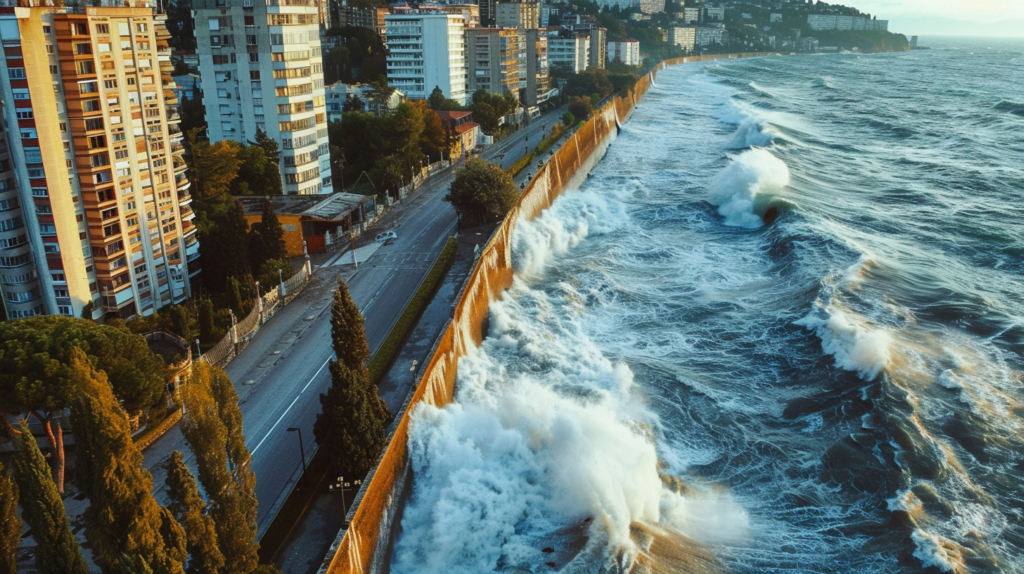AQUARIA – In a groundbreaking triumph against climate change, the coastal city of Aquaria has successfully reversed its long-standing flooding problems by adopting a revolutionary sea wall design. The innovative solution has garnered international acclaim and offers a promising blueprint for other vulnerable coastal areas around the world.
For decades, Aquaria struggled with frequent and severe flooding due to rising sea levels and increasingly intense storms. Traditional sea walls and levees proved inadequate, often failing to protect the city’s infrastructure and residents. In response, the city commissioned a team of engineers and environmental scientists to develop a more effective solution.
The result was a state-of-the-art sea wall known as the “Dynamic Barrier System” (DBS). Unlike conventional sea walls, the DBS is designed to adapt to changing environmental conditions in real-time. The wall is composed of modular, interconnected panels that can be adjusted for height and angle based on real-time data from weather forecasts and ocean sensors.
“The Dynamic Barrier System represents a significant advancement in coastal protection technology,” said Dr. Elena Vargas, the lead engineer behind the project. “Its ability to dynamically respond to environmental changes ensures that it provides maximum protection under a wide range of conditions.”
Since the installation of the DBS, Aquaria has seen a dramatic reduction in flooding incidents. The system successfully withstood a recent major storm, preventing what would have been catastrophic flooding under the old system. The city’s infrastructure, homes, and businesses remained dry, and residents reported a newfound sense of security.
Mayor Carlos Mendoza of Aquaria praised the project’s success and its impact on the community. “This innovative sea wall has not only protected our city but also restored hope and confidence among our residents,” he said. “We can now look forward to a safer and more resilient future.”
The success of the DBS in Aquaria has attracted global attention. Coastal cities around the world, facing similar challenges, are exploring the adoption of the technology. Delegations from numerous countries have visited Aquaria to learn about the design, implementation, and performance of the system.
Environmental groups have also lauded the DBS for its environmentally friendly approach. The system’s modular design allows for the preservation of natural coastal habitats, and its adaptability minimizes the impact on marine life. The project has been recognized with several international awards for innovation and sustainability.
Dr. Maria Gonzalez, a climate scientist at the Global Institute for Environmental Research, emphasized the broader significance of Aquaria’s achievement. “The success of the Dynamic Barrier System is a powerful example of how human ingenuity and technology can address the challenges posed by climate change,” she said. “It provides a hopeful vision for the future of coastal cities worldwide.”
Aquaria’s experience with the DBS has also spurred local economic growth. The project created numerous jobs during its development and construction phases, and the enhanced protection has attracted new businesses and investments to the city. The local tourism industry, once threatened by the constant risk of flooding, is now thriving as visitors flock to see the innovative sea wall and enjoy the city’s revitalized waterfront.
As Aquaria celebrates its climate victory, the city continues to invest in sustainability and resilience. Plans are underway to further integrate renewable energy sources, improve public transportation, and enhance green spaces. The city’s comprehensive approach to climate adaptation serves as a model for other communities seeking to safeguard their futures in an era of environmental uncertainty.
The story of Aquaria and its Dynamic Barrier System stands as a testament to the power of innovation, collaboration, and determination in the face of climate challenges. It offers a beacon of hope and inspiration for cities around the world striving to build a more resilient and sustainable future.

